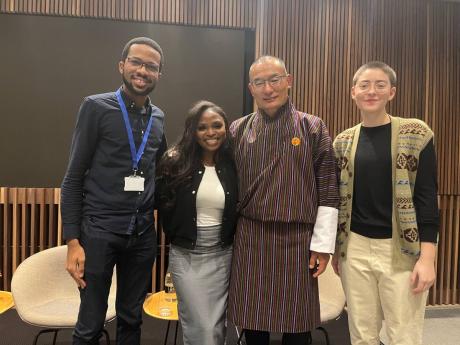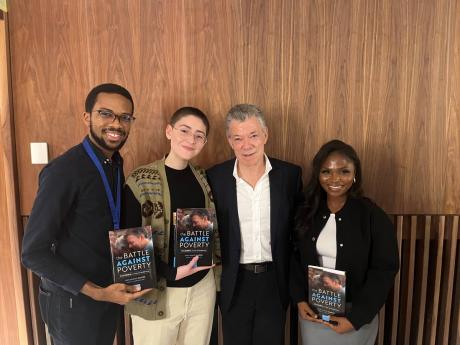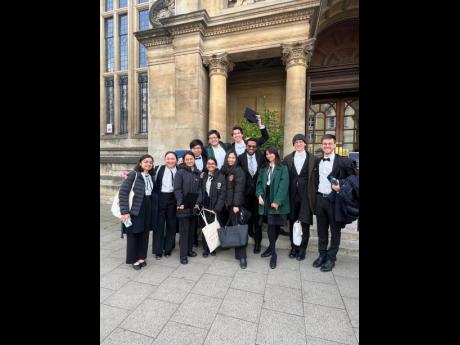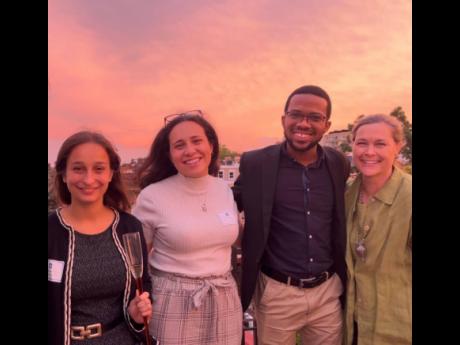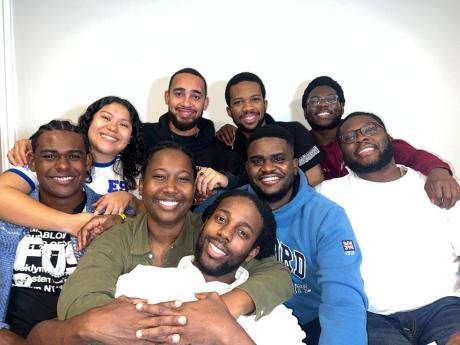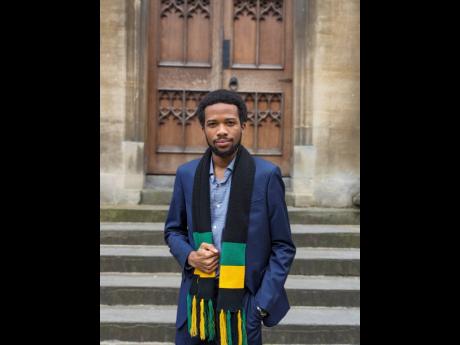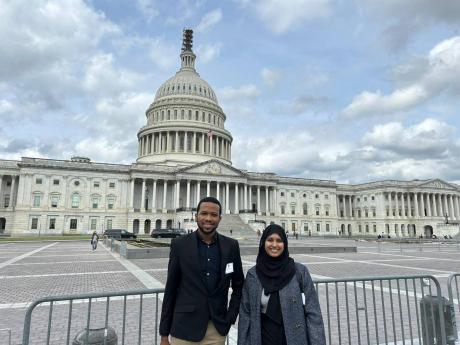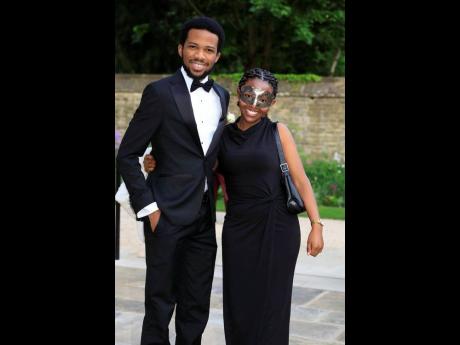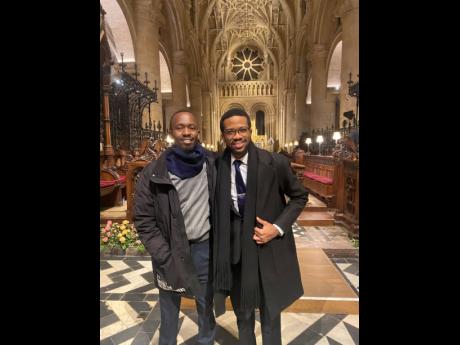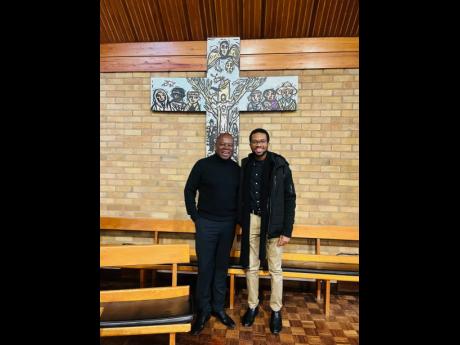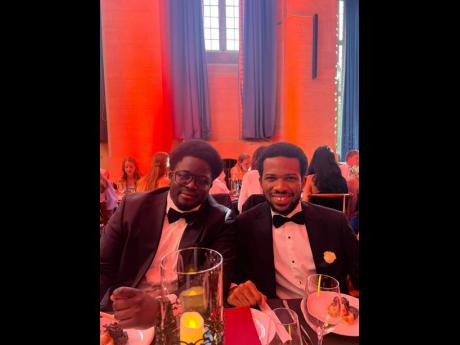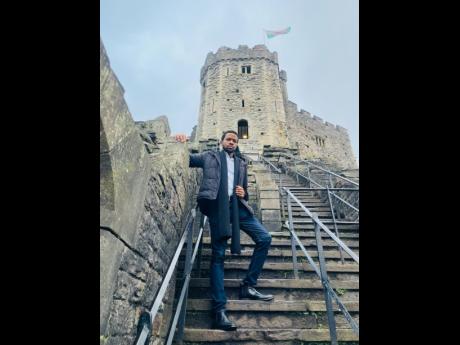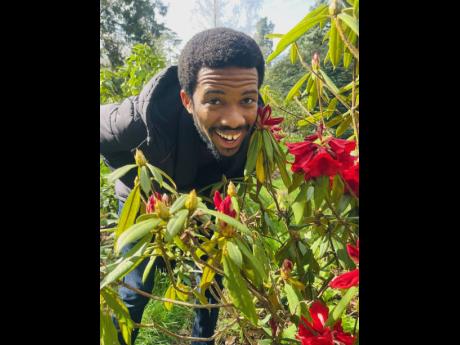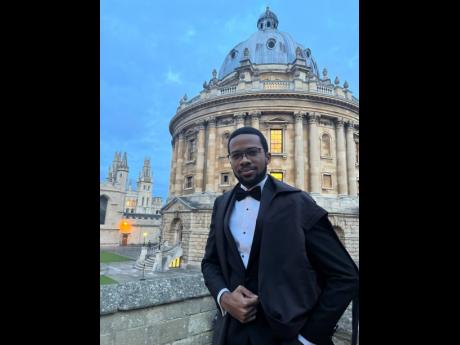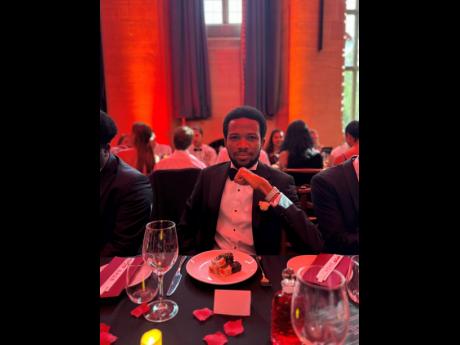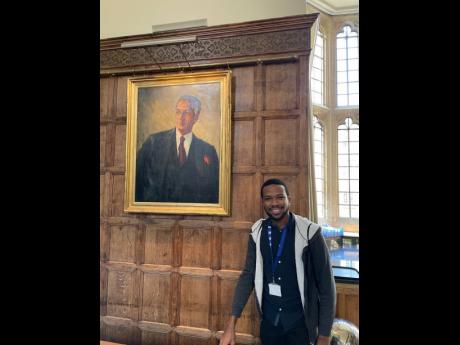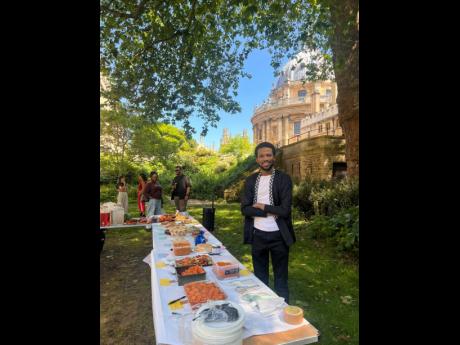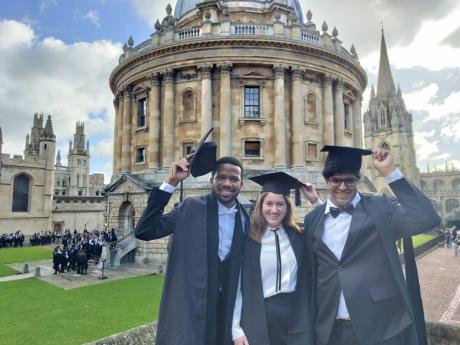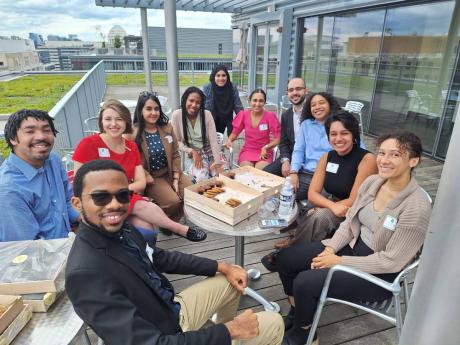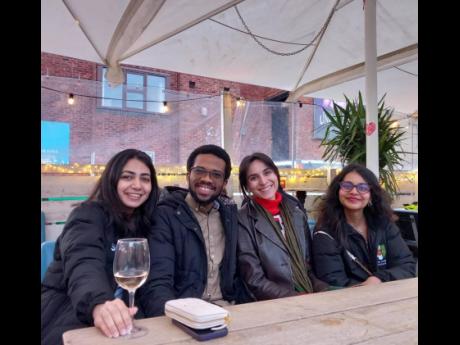Entering through the doors of Oxford
After his first year at the University of Oxford, Jamaica’s 2023 Rhodes Scholar David Salmon recounts his experience in the United Kingdom.
When reflecting on the journey through my first year at the University of Oxford, it is difficult to determine where to start. Does one highlight important events that occurred in chronological order, the opportunities I received or the people I met? Or do I start by contemplating my time as a Rhodes Scholar? The truth is that the Oxford journey is not a singular experience, but a series of threads that are interwoven to create a tapestry of rich and vivid memories.
The Starting Steps
From very early, the Rhodes Scholar community proved to be a place where friendships could be cultivated. For instance, during one of the online Zoom sessions held with incoming scholars in May, I met the Commonwealth Caribbean’s Alyssa Mohammed, and East Africa’s Gloria Charité. I also benefited from having a fellow Rhodes Scholar with me at Cambridge University, Yonatan Gideoni. These persons would become some of my closest friends and this was an auspicious start to the journey, even though I had not yet entered the doors of Oxford.
I never expected to have such a different experience, as I had just completed studies at Cambridge. There, I loved going on morning walks, living in Wolfson College and having meaningful conversations with both students and staff.
Living away from home for the first time meant that there were sometimes episodes that were punctuated by a deep and heavy loneliness. Hence, I thought, why would Oxford be any different? And yet, it was.
For example, one of the happiest memories I had was spending time with my American counterparts. Each year, the Association of American Rhodes Scholars hosts a Bon Voyage Weekend, where they invite Caribbean scholars to Washington, DC for a weekend. This was the first time I had visited the US capital, and I was impressed by the palatial edifices that celebrate America’s democracy, including the Capitol Building and the Lincoln Memorial. Other highlights included the National Museum of African American History and Culture, where I was in awe at its design, particularly its ornate, bronze-coloured lattice façade. That same day, we also visited the White House and had discussions with senior officials in the Biden administration.
However, the weekend’s highlight was having dinner with Rhodes alumni Martina Vandenberg and her husband, Alan Cooperman. It was delightful listening to their experiences in Eastern Europe prior to the collapse of the Soviet Union, talking with Alan about his work with the Pew Research Centre, and Martina’s efforts to establish the Human Trafficking Legal Centre. Naturally, such a weekend would come to a close with a grand dinner. Held at the Cosmos Club, this event was filled with alumni sharing their experiences, including where they travelled and how they met their spouses in Oxford.
Finding a Community
After arriving from a long flight, it was exciting to see a familiar face. At Rhodes House, I was welcomed by Tonia Williams, the Jamaican Rhodes Scholar selected in the previous year. She helped me to settle in and it was a great introduction to the unmatched hospitality, kindness and togetherness that was exemplified by the Oxford Caribbean community.
This was a family away from home and I loved spending time with them, whether it be seeing Fitzroy ‘Pablo’ Wickam and Jelani Munroe performing plays, Shakeba Foster preaching or having dinners with authentic Caribbean food. This community also helped me to tackle some of the most difficult challenges, including navigating the university bureaucracy or an even more daunting task – finding a barber.
Moreover, another community I relied on came from the John Bunyon Baptist Church. Led by the amiable and gentle Reverend Wale Hudson-Roberts, this community served as a spiritual anchor, especially as academic commitments increased exponentially throughout the year.
Oxford is an interesting place, as the grand but cold exterior of its buildings often belie the warmth of its students. This was the case with my college’s graduate student population. Oxford is divided into more than 30 constituent colleges, each with its own campus, history and culture.
Consequently, life revolves around the college you are attached to.
Located in the city centre, my college Exeter, boasts about having one of the most supportive graduate communities. This is organised around the focal point of college life, the middle common room (MRC).
Very early during this first year, I was encouraged to apply for the position of the race and ethnicity equality officer on the MCR committee. Being a part of the MCR leadership was a high point despite having had little prior experience with diversity, equity and inclusion initiatives. For example, I relished organising the MCR’s Multicultural Potluck as it gave me the opportunity to introduce Jamaican escovitch fish to the college. Students loved it, even though as one friend said it represents a “tasty, yet
dangerous hazard” for those not used to eating non-fillet fish.
I also enjoyed assisting with organising the MRC’s portrait series. This series highlights Exeter College’s first black female students. Interestingly, Trinidad and Tobago’s Lisa McShine was the first alumni to receive this honour, as she attended the college during the mid-1980s.
Studying in Oxford
Curiously, one bizarre yet underappreciated aspect of university life was Oxford’s maze of rituals. One of these formalities was the matriculation ceremony which all students are required to attend, in order to become officially enrolled at the university. Therefore, on a frosty October morning, we lined up dressed in the sub fusc, a Latin term that describes an academic dress comprised of a gown worn over a darkly coloured suit.
Afterwards, we proceeded to the Sheldonian Theatre to observe a brief ceremony, completely in Latin, which officially commemorated the start of life as an Oxford student.
A converted pre-20th-century mansion at the corner of Mansfield Road, Queen Elizabeth House (QEH) served as the location of the Oxford Department of International Development. Here, I would spend most of my time during the term. This beige, cut-stone structure was where colonial administrators received training before they were distributed throughout the British Empire. And yet, its halls now contained a range of mainly international students, eager to tackle the burning legacies of colonialism. This was certainly true of my cohort in the Development Studies Master of Philosophy programme.
QEH also has some extremely supportive staff such as Gary Jones, who never ceased to hand out biscuits (or the occasional wine) to nerve-wracked students anxious to receive their essay’s score. The academic commitments of this course were made easier by the phenomenal students in my programme who never missed an opportunity to arrange a meet-up, whether it be to get lunch, have picnics, visit the pub, a restaurant or the library. Soon this random collection of diverse, progressive thinkers would become a conscientious cadre of friends.
Having the support of this group was quite helpful, given that many of us were being exposed to new subjects. For instance, I embarked on learning more about anthropology, a discipline I likened to as a mercurial spouse that I would grow to respect. In the end, we made our peace.
Christmas in the United Kingdom
The same could not be said about experiencing winter in the United Kingdom. Denied the warmth of the Caribbean, it was not initially apparent that going to Wales was the right decision, given its cold and damp climate. Nevertheless, it proved worthwhile visiting another constituent nation of the UK. The Welsh capital, Cardiff, was incredibly stunning, especially seeing the lights from the humble stalls of the Christmas Market. Another impressive site was Cardiff Castle, a Normanera stronghold which stands as a stolid reminder of the enduring history of the British Isles.
While touring the castle, I was constantly reminded of how history is a dynamic process that is constantly in motion. Despite being nearly a millennia old, this castle has been used, repurposed and reconstructed multiple times. Sometimes, its keep housed nobility, other times its curtain walls repelled an invading army, and less than a century ago, its chambers were used as a place of refuge by citizens seeking protection during the dark days of the Second World War. The past and the present constantly interact with each other, and this epitomises the UK experience.
Part II: Being a Rhodes Scholar in a Distant Land
The interaction between the past and present is perfectly displayed when frequenting Rhodes House. Walking through the portico into the rotunda, one cannot help but marvel at the dome, which is inscribed with the names of previous Rhodes Scholars, including Jamaicans, who died in the two World Wars. The recently completed sculptural stone staircase that descends into the basement is at the centre of the rotunda. This staircase leads into a foyer that is linked to a newly created conference hall. Here, 21st- century renovations complement the building’s 20th-century design.
The past now meets the present and this year was the first cohort to benefit from these renovations. Rhodes House played a dual role for me as, on one hand, it served as a centre for discussion with similar (or nor so similar) minded scholars who never tire at examining the pressing matters of the day. On the other hand, it doubled as a fortress of solitude, where I could stay up to 11 p.m. concentrating on studies. The Rhodes House Library was one place I enjoyed, and during breaks I would examine the portraits of previous cohorts of scholars in an attempt to identify Jamaicans like Reverend Ronald Thwaites, Delroy Chuck and Dr Nigel Clarke.
Outside of studying or having conversations, I would also attend talks held within the building’s halls. Oxford is the kind of place where you can randomly meet professionals that are pioneers of industry, specialists in their field or even Nobel Prize recipients. For instance, Juan Manuel Santos, former president of Colombia and Nobel Prize recipient, was one such person whom I had the privilege of meeting at Rhodes House. I also took pleasure in speaking with Tshering Tobgay, a Bhutanese politician, environmentalist, and advocate who became his country’s prime minister for a second stint shortly after we met in October. What stood out from these interactions is how committed these individuals are to serving their countries and tackling global issues such as poverty or environmental degradation.
Navigating the Contradictions of Oxford
There are no shortages of contradictions present in Oxford. I live in a city that possess all the trappings of grandeur and yet, there is a lack of subtlety around the origins of such wealth. My own department is a hub of progressive thinking that exists within a structure that trained colonial administrators. Unsurprisingly, many of Oxford’s buildings are monuments that celebrate empire.
The irony is not lost on me as a Jamaican who applied for and received the Rhodes Scholarship. This bursary was initially designed to bring the world’s “brightest and best” to study in the UK, with the objective to extend British imperial influence. This scholarship is tenable at an institution with an extensive history that is in many ways connected with some of the worst impulses and atrocities man has committed against man, including chattel slavery and apartheid.
Under normal circumstances, one is prone to relegate these thoughts to the back of the mind or ignore them altogether, especially after entering the gates of Oxford. Now, these debates are once again thrust to the forefront of my mind, given the ongoing conflict in Gaza. This was on display during our Rhodes Character, Service and Leadership (CSLP) Retreat in March. When coming to Leamington Spa, many of us expected that it would be a relaxing experience where we would ultimately be at peace. How wrong we were.
The CSLP Retreat was an uncomfortable, soulful affair where it was impossible to remain complacent in one’s beliefs. During this time, two conflicts raged on in the scholars’ community. One theatre of war revolved around how to respond to the ongoing crisis on distant battlefields in Gaza. However, buried deep in the subconscious of many attendees, another battle raged on which focused on the question, “What role should Rhodes Scholars play in this world?”
It is easy to characterise institutions like the Rhodes Trust as a Janus-faced leviathan imbued with hypocrisy and oozing inertia. Indeed, given that the Rhodes Scholarship champions the mantra of “fighting the world’s fight”, the perceived reticence of the institution to take more concrete steps to show solidarity with victims of the Israel-Hamas conflict proved to be untenable for some.
However, a takeaway from this retreat is that the realities of leadership are often far more complex and nuanced. Certainly, from the final exercise, several expressed how they abandoned the moral certainty that they applied to the analysis of issues. As we fight the world’s battle, it is useful to remind ourselves that in war, truth is often shrouded by a retinue of lies – the lies we tell ourselves and the lies shaped by our prejudices and experiences. Our role is to decipher the truth from lies as we arm ourselves for the great crusade of change. This is our burden. This is our war.
Conversely, the CSLP Retreat facilitated an opportunity to know more about this cohort of scholars. In getting to know each other, we came to realise that most are not scions from noble families inheriting intergenerational wealth and status. Many are humble and conscientious souls who, like each other, are wrestling with the privilege and mandate of being a standard-bearer for the downtrodden.
Experiencing the Highs
The kindred spirits of this community would prove to be one of the major highs of this first year in Oxford. This was a discovery that was made throughout the year, due to the array of events organised by the Rhodes Scholars Programming and Events Team. This included meet and mingles, coming-up dinner for the incoming class of scholars, as well as sessions held with external speakers.
One of my favourite memories included visiting Harcourt Arboretum, where we not only saw a diverse canopy of trees splashed with white, pink, red and yellow flowers, but we also saw peacocks who welcomed us with a dazzling display of emerald and teal feathers. Seeing such as spectacular bird was a welcomed sight in Easter.
The contrast between Oxford in spring versus winter could not be any sharper, as the latter is particularly dreary since trees lose their vitality, and the rolling hills are often blanketed by a grey canvass of clouds. Even when there is sunshine, frigid winds are quick to remind you that the sun in the sky serves a similar role to the lightbulb in a fridge - it gives light, not warmth. Although, there were surprises along the way, including seeing a rare display of the Northern Lights in March.
Additionally, two events that also stood out to me was a small constituents dinner hosted by Warden and Rhodes Trust CEO Dr Elizabeth Kiss. This dinner was open to constituencies that had a small number of scholars selected, such as Jamaica, Malaysia, Singapore and the Commonwealth Caribbean. It was a delight listening to her experiences, including her time in Oxford as a Rhodes Scholar and the lessons learnt from her parents, who emigrated from Hungary amid political repression from the Soviet Union.
Moreover, another highlight was the Rhodes Ball. There is no shortage of opportunities to dress up in Oxford. However, dressing up with friends is always welcomed.
Certainly, a memorable moment was seeing William Lugoloobi from Uganda on the dance floor and spending time with Mwangi Mwaura from Kenya. Savouring tasty food, dancing and being free were all experiences the Rhodes Ball brought out, and more.
Other standout events included going to formal dinners in several colleges, such as Christ Church, Linacre and New College. And remarkably, something that I learnt to love was riding a bicycle. I previously retaught myself how to ride in the waning months of Cambridge. However, it was in Oxford where I embraced the liberation of having every location in the city centre being less than 20 minutes away.
Managing the Lows
For every zenith, there is also a nadir. This came during the exam period.
Oxford exams are a curious observation. First, we must wear a suit with a gown to do final exams on computers. Interestingly, carnations are worn on our lapels as we walk down the High Street towards the Examination School.
This period proved to be more difficult than expected for a few reasons.
For one, an impacted wisdom tooth decided to launch its assault while I marshalled my notes for my exams. Thankfully, Rhodes House very generously paid for it to be extracted. On a more heartfelt level, it proved challenging due to events closer to home. For instance, I lost a childhood friend, Kevin Vasciannie, who was killed in Antigua, and in the span of a week, a former Gleaner colleague, Job Nelson, died in a car accident. These were tough moments to process when doing exams, even more so when you are away in another country, unable to give any support to family back home.
Nevertheless, what made it less overwhelming was having the support of the Caribbean community and a wider family of friends who I could depend on in trying circumstances. Seeing Shakespeare’s The Two Gentleman from Verona, which included brilliant performances from Fitzroy and Jelani, certainly helped. Also, having dinner with the Caribbean community, exploring Sikh culture in Oxford’s annual Langar event, and having friendships with others helped in managing these low points.
Final Note
Nine months later, after three terms, a dozen dinners, meeting two former heads of state, an uncountable number of experts and more than 100 scholars, I look back and marvel at this first year in Oxford. If there is one takeaway that I have, it is that Oxford is not the grand structures of stone, or the rich history of a past long gone. Oxford is a living, breathing organism full of vitality. It is the people here who make the Oxford experience remarkable.

